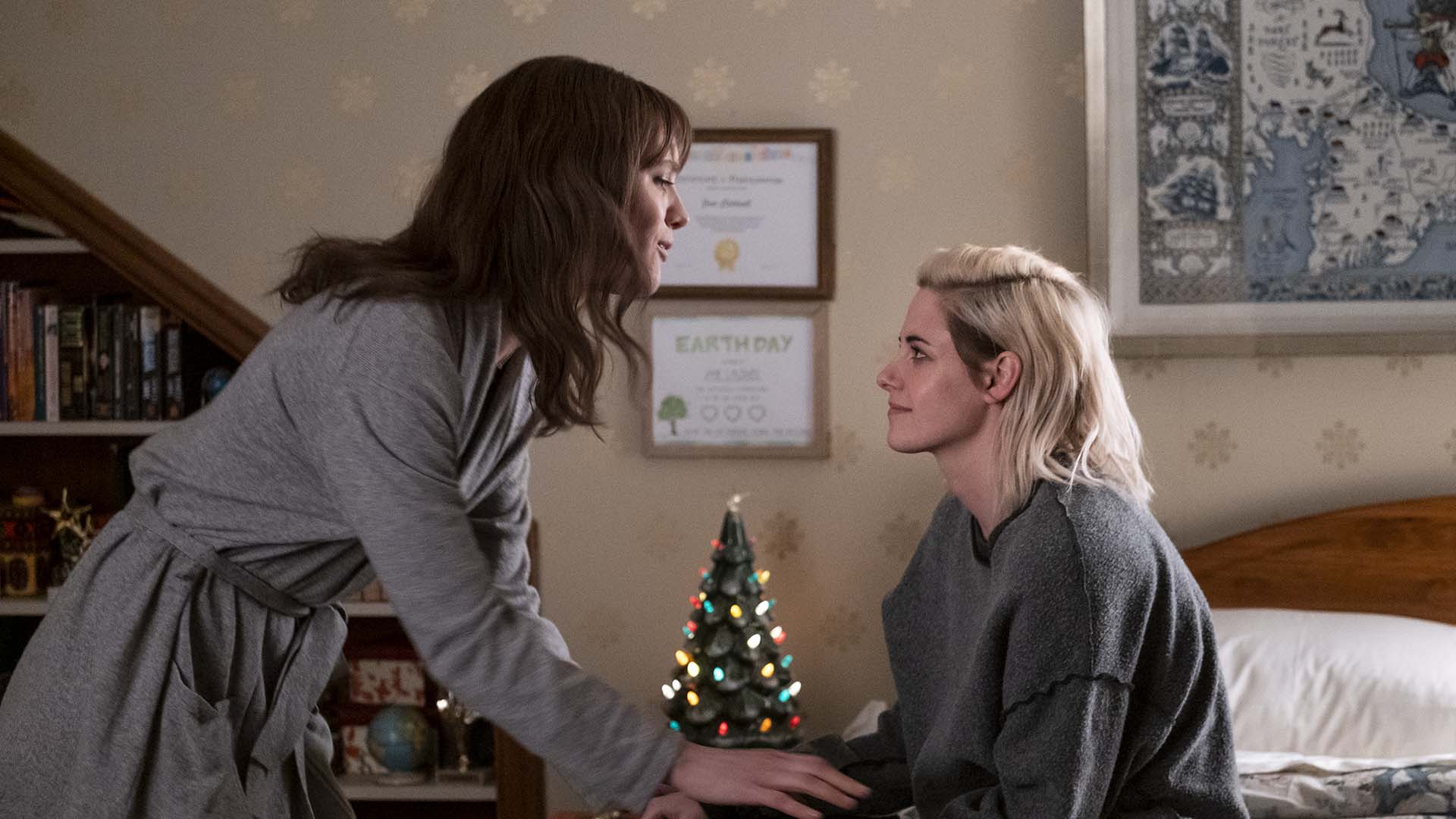Happiest Season
Starring Kristen Stewart and Mackenzie Davis, this festive rom-com gives its well-worn genre a much-needed queer focus.
Overview
UPDATE, December 20, 2021: Happiest Season is available to stream via Amazon Prime Video, Foxtel Now, Google Play, YouTube Movies and iTunes.

Heading home for the holidays and stepping into a sea of interpersonal dramas is a familiar on-screen set-up, as a new movie every Christmas or so reminds us. By now, then, we all know the formula. Adult children make the pilgrimage to their parents' place, rivalries and animosities flare up, secrets are spilled, chaos ensues and, by the end of the film's running time, everyone has learned something. Happiest Season fits the template perfectly. With the merriest time of the year in full swing, the Caldwells converge on the Pennsylvanian family home, with their celebrations given an extra edge due to patriarch Ted's (Victor Garber, Dark Waters) mayoral campaign. His fastidious wife Tipper (Mary Steenburgen, The Book Club) insists on snapping every moment for his Instagram feed, all as stern eldest daughter Sloane (Alison Brie, GLOW) arrives with her husband (Burl Moseley, Crazy Ex-Girlfriend), two children (Asiyih and Anis N'Dobe) and plenty of unspoken tension in tow; zany middle sister and aspiring fantasy writer Jane (Mary Holland, Between Two Ferns: The Movie) is largely ignored; and Pittsburgh-based political journalist Harper (Mackenzie Davis, Irresistible) returns with the girlfriend, Abby (Kristen Stewart, Charlie's Angels), that none of her relatives know about because she hasn't come out to them yet.
If someone other than The Faculty, Girl, Interrupted, Veep and The Handmaid's Tale actor-turned-filmmaker Clea DuVall had made Happiest Season, the above paragraph would accurately reflect the feature's character hierarchy — because Sloane would take centre stage, and Harper and Abby would hover around the narrative's edges. But DuVall did make Happiest Season and, with co-writer Holland, she flips the movie's focus, even while still sticking with a well-worn general premise. Accordingly, this festive flick resembles a comfy sweater that often gets a wear, but seems welcomely different on this particular occasion. As Aussie queer teen rom-com Ellie and Abbie (and Ellie's Dead Aunt) also demonstrated this year, it shouldn't be so subversive to take an overused genre that's heavy on recognisable tropes, then strip away the engrained heteronormativity. But it is, in both high school-set romances and movies about meeting your partner's parents over eggnog.
After filling the credits with details of the formative stages of Harper and Abby's relationship, the feature introduces them properly as they're touring local Christmas lights. The towering Harper is giddier than one might expect of someone of her age, but the calmer Abby isn't fussed about the season after losing her parents when she was a teenager. When the former asks the latter to come home with her for Christmas, though, Abby gets excited. She wants to pop the question anyway, and figures there's no time or place better to make the festive-loving Harper her fiancée — although her best friend John (Dan Levy, Schitt's Creek) points out that asking Harper's dad's permission beforehand is hardly a progressive step.
It isn't until Happiest Season's central couple has almost reached the Caldwells' that Abby discovers Harper's subterfuge. Not only do Ted, Tipper and company not know that Harper is gay and in a relationship, but Abby is asked to pretend she's straight as well (yes, one gag literally places her in a closet, because of course that happens). In the broad strokes, the movie doesn't serve up any surprises. But like moving its focus to Harper and Abby, this Christmas rom-com is all about the details. Amid the sibling struggles, the re-emergence of old flames both male (Jake McDorman, What We Do in the Shadows) and female (Aubrey Plaza, Parks and Recreation), and the always-hectic whirlwind that surrounds every seasonal family affair — and every attempt to run for political office, too — Happiest Season explores two crucial themes in a meaningful way. First, it unpacks the performative nature of human existence, where too often we're all trying to match other people's perceptions and expectations without consistently remaining true to ourselves. And, it also interrogates how coming out isn't a simple or straightforward act, even in seemingly loving circumstances.
These are weighty ideas and, while Happiest Season is light and jovial overall, it doesn't sugarcoat its heavier moments. It doesn't devote all of its running time to them either, but DuVall and Holland's script finds a delicate balance — with the part played by Holland herself at first seeming to be the movie's most overtly exaggerated role for comedic effect, but eventually proving more thoughtful, for instance. It's easy to see how the screenwriting pair could've turned this into a different picture, with the initially tentative friendship that springs up between Abby and Plaza's Riley, and the commonalities they feel as women who've been pushed aside so Harper could maintain a lie, 100-percent begging for an entire movie of its own. But DuVall never forgets the task that she has clearly set herself: to make a queer meet-the-parents Christmas comedy. The film's warm-hued, Hallmark-style imagery never lets the audience overlook the fact that Happiest Season willingly sticks to a formula in order to update it, either.
Also apparent is just how well Stewart and Davis anchor the movie's generic and more soulful elements alike. This shouldn't come as a surprise, with Stewart picking most of her post-Twilight roles astutely (see: Clouds of Sils Maria, Certain Women, Personal Shopper and Seberg), and Davis always a memorable addition to any cast. In their hands, their characters feel lived-in. So does Happiest Season's central relationship, especially as it navigates considerable ups and downs, including an ongoing series of questionable decisions by Harper. Steenburgen, Plaza, Levy, Brie, Garber — they're all reliably great, too, but it's likely this LGBTQIA+-friendly dose of merriment wouldn't have found the right mix of festive familiarity and emotional substance with other leads.





